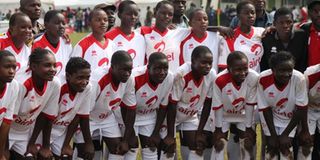Why, as a country, do we shun and fail to recognise our role models?

Butere Girls High football team pose for a photo before their semi-final tie against pre-match favourites Tartar Girls at Kakamega High School on August 8, 2014. Butere Girls High was once headed by Mrs Priscilla Were. PHOTO | ISAAC WALE |
What you need to know:
- There are good reasons why Mrs Were’s students feel strongly about her contribution to their life and to education in general.
- She continues to empower young students to find solutions to their own challenges rather than waiting for the director of the school to issue instructions or find solutions.
Last week I wrote about Mrs Priscilla Were, a doyen in Kenya’s education history. I received a number of responses that force me to return to this story this week. One former student of Mrs Were, Margery Kabuya, wrote to compliment this paper for recognising this rare story and sought to reinforce my argument about the centrality of values in our education system.
Daniel Ogana also wrote to decry how, as a country, we developed ‘‘a most weird and skewed education system that vomits poorly prepared nationals while still expecting excellence from them.’’
Another former student, Josephine Ayiera Muluka protested that what I wrote was too brief and ‘‘felt like a meal stopping just after the appetiser.’’ Josephine Muluka chairs Bunyore Girls High School Alumni association, which was launched in December 2012.
It was particularly interesting to speak to Dr Leah Tsuma, a research scientist teaching at the University of Eldoret and entrepreneur running her company, Asticom (K) Ltd, who cited tenacity as Mrs Were’s defining legacy. She points out that Mrs Were ‘‘never believed that there was anything called impossible as far as moulding brains was concerned. She also believed that every child was capable of excelling.’’
There are good reasons why Mrs Were’s students feel strongly about her contribution to their life and to education in general. Indeed, like them, I wonder where our local universities source those to whom they confer honorary degrees if Mrs Were has not attracted their notice. This is because many people you speak to remember her for a very long lasting impact and speak of how this impact continues to guide them today.
Take Mrs Kabuya, for instance, the author of Celebrating Friendship among Women: The Power of True Women Connections. She recalls how Mrs Were impacted her way back in 1974 when she was at Butere Girls High School.
More than 40 years later, this impact runs deep. For Mrs Kabuya, this impact has been so long lasting that she continues to draw from that inspiration.
She argues that ‘‘a good teacher teaches, a better teacher trains and a great teacher inspires’’ and concludes that this is ‘‘really true in the case of Mrs Were.’’
What is remarkable is that Mrs Were continues to perfect the art of educating and inspiring others including school principals that she mentors. Indeed, she clearly has been a student of the very process she has been involved in.
There are some of her former students who feel that she was too hard on them. Others transferred school to run away to less restrictive places. But over the years, important lessons were learned and have been cumulated leading to her current approach where she feels no need for school rules.
EMPOWER YOUNG STUDENTS
She continues to empower young students to find solutions to their own challenges rather than waiting for the director of the school to issue instructions or find solutions.
The inversion of the notion of leadership that Mrs Were is practising is a useful lesson for our national politics in two areas. First, her desire to ensure that her school has a student from each of Kenya’s communities directly addresses our national political culture that is built on ethnic exclusivism.
Second, we must expose the falsehood in the assumption that there can be one almighty leader who is capable of solving all our problems in each and every one of the multiple and contradictory situations that we face.
We need to recognise that our leadership capacities are naturally limited; our ability to proffer solutions depends on the nature of the leadership challenge and its context.
If there is one big lesson, it is that situations do call for different leadership abilities. Why then do we imagine that leadership is a linear process that runs top down?
Godwin Murunga is senior research fellow, Institute for Development Studies, University of Nairobi. [email protected]





